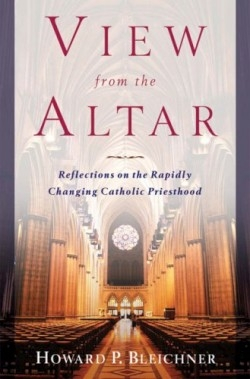
View from the Altar
Reflections on the Rapidly Changing Catholic Priesthood
“By any measure, the sexual abuse scandals have struck the Catholic Church in the United States with the force of a tsunami,” writes the author, “dealing the Catholic priesthood the worst blow in memory.” Stung by the magnitude of the sexual abuse cases and the Roman Catholic Church’s failure to deal with the scandal, Bleichner, who is a priest, addresses why the abuses happened and how an improved doctrine of the priesthood will not only avoid scandals of this scale in the future but has already resulted in a better priesthood than that of pre-1960.
The book begins with a selective historical review of church history beginning just prior to the Second Vatican Council (1962-65) and ends with the recent sex abuse scandals. Bleichner feels that seminaries and seminarians were left rudderless by the forces of Vatican II, humanistic psychology, and the widespread disobedience to Humanae Vitae within the Church. While the damage had been done, he feels the situation improved in the early 1980s with a reestablishment of authority by John Paul II and a papal review of all U.S. Catholic seminaries.
These scandals are not the real topic of View from the Altar; they are merely the reason that necessitates a reflection upon the important theological matters that are affecting a priesthood amidst change. The common forms of living-prayer, simplicity, celibacy, authority, and obedience-are explained from a positive perspective. The chapter on obedience and authority is especially enlightening, emphasizing the responsibility of properly using authority. Bleichner explains changes in the doctrine, theology, and offices of the priesthood instituted by Vatican II as a maturing and improving development of the vocation.
Bleichner served briefly as rector of St. Patrick’s Seminary in Menlo Park, California before becoming rector of Theological College, the seminary of The Catholic University of America, from 1992 to 2002. As seminarian, scholar, priest, and finally rector during the period he discusses, Bleichner is uniquely qualified to reflect upon the changes in society, the Church, and the priesthood.
Bleichner’s musings flow easily through a simple style of writing about complex theological issues. Especially effective are the many anecdotes that he provides to illustrate doctrinal and theological points. Obviously an excellent preacher, he is able to transfer his skills to the text. Detracting from an otherwise insightful and fair account, he states that the priesthood has been “tarnished by a broad-based suspicion of child abuse and populated largely by gay men.” This unsubstantiated linking of pedophilia to homosexuality is not typical of his generally balanced book.
Bleichner’s reflections offer a humanistic, insightful understanding to a complex theological change in the role of the Roman Catholic priesthood.
Reviewed by
Paul Deane
Disclosure: This article is not an endorsement, but a review. The publisher of this book provided free copies of the book to have their book reviewed by a professional reviewer. No fee was paid by the publisher for this review. Foreword Reviews only recommends books that we love. Foreword Magazine, Inc. is disclosing this in accordance with the Federal Trade Commission’s 16 CFR, Part 255.
